Aromatherapy offers significant benefits for anxiety management and mood improvement through the use of essential oils. This approach reduces stress, enhances sleep quality, and fosters emotional balance. Popular oils like lavender and bergamot are effective in alleviating anxiety and promoting relaxation. Incorporating aromatherapy into daily routines can create a calming atmosphere and support overall mental wellness.
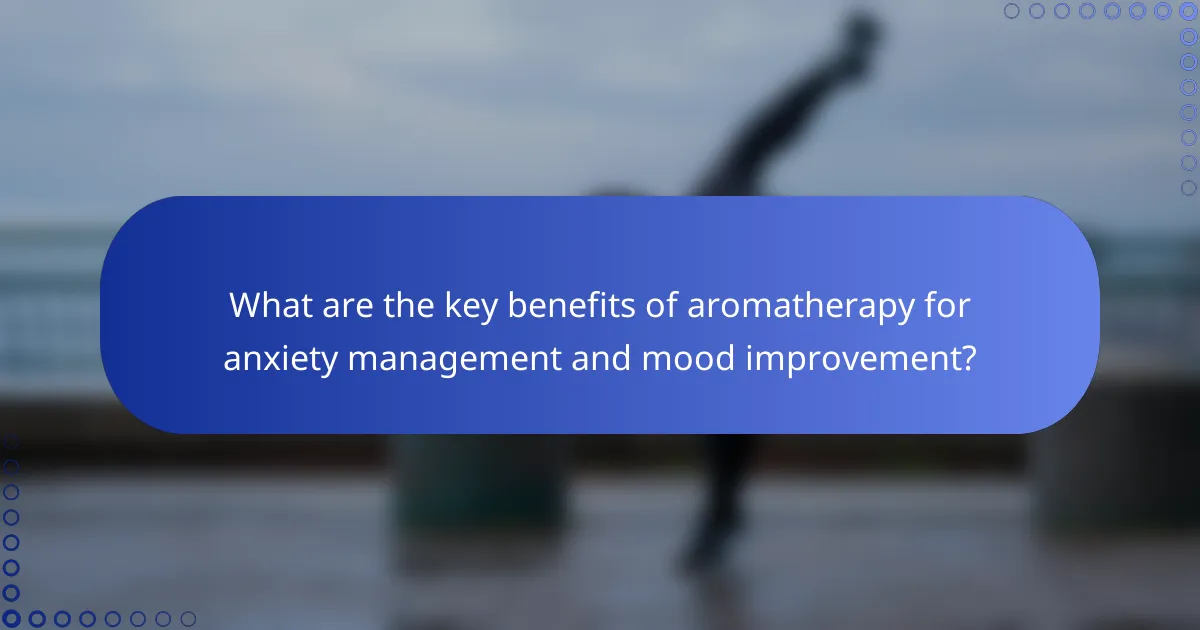
What are the key benefits of aromatherapy for anxiety management and mood improvement?
Aromatherapy effectively reduces anxiety and enhances mood through essential oils. Key benefits include stress reduction, improved sleep quality, and increased emotional balance. Lavender oil, for instance, is known for its calming effects, reducing anxiety levels by up to 30%. Citrus oils like bergamot elevate mood and promote relaxation, making them popular in anxiety management. Regular use of aromatherapy can foster a sense of well-being, supporting mental health naturally.
How does aromatherapy influence the brain’s response to stress?
Aromatherapy positively influences the brain’s response to stress by promoting relaxation and reducing anxiety. Essential oils, such as lavender and chamomile, activate the limbic system, which regulates emotions. Studies show that inhaling these scents can decrease cortisol levels, leading to lower stress responses. Additionally, aromatherapy enhances mood by stimulating neurotransmitters like serotonin and dopamine, contributing to overall emotional well-being. This holistic approach offers a natural alternative for managing stress and improving mental health.
Which essential oils are most effective for reducing anxiety?
Lavender, chamomile, and bergamot are among the most effective essential oils for reducing anxiety. Lavender oil promotes relaxation and improves sleep quality. Chamomile oil has calming properties that help ease stress. Bergamot oil uplifts mood and reduces feelings of tension. Other notable mentions include frankincense, ylang-ylang, and sandalwood, which also contribute to anxiety relief through their soothing aromas.
What role does scent play in emotional regulation?
Scent plays a crucial role in emotional regulation by influencing mood and reducing anxiety. Aromatherapy utilizes essential oils to stimulate the olfactory system, which directly connects to the brain’s emotional centers. For example, lavender is known for its calming effects, while citrus scents can enhance mood and energy levels. Studies show that inhaling specific scents can lead to measurable decreases in stress levels, promoting relaxation and emotional balance. This connection highlights the unique attribute of scent as a powerful tool in anxiety management and mood improvement.
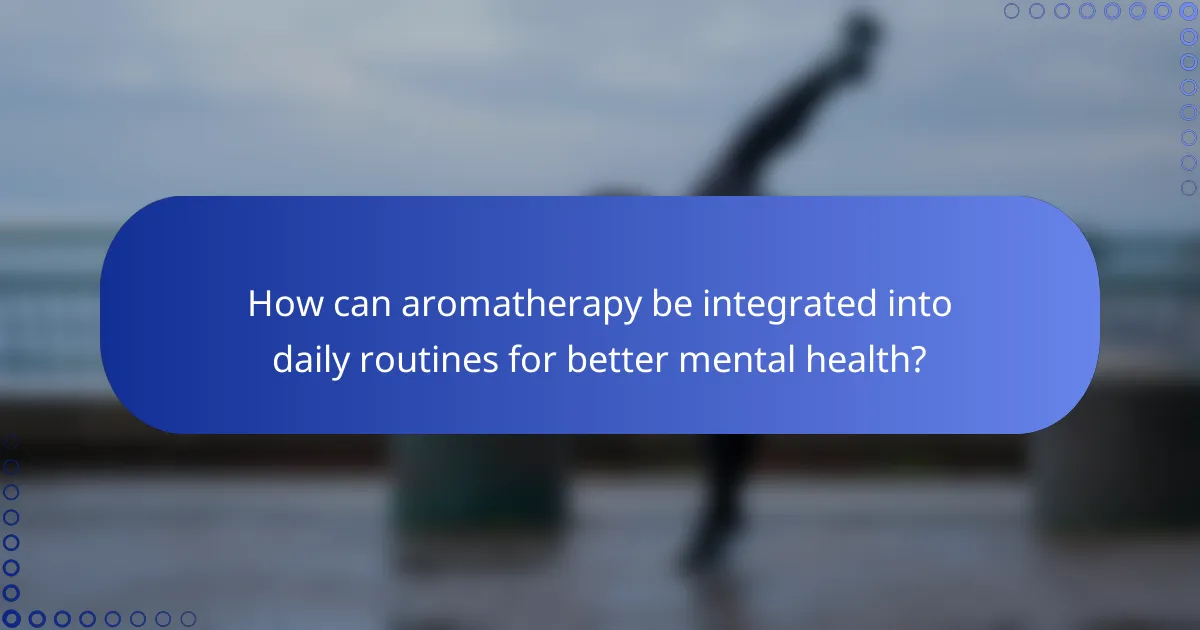
How can aromatherapy be integrated into daily routines for better mental health?
Aromatherapy can be seamlessly integrated into daily routines to enhance mental health by reducing anxiety and improving mood. Incorporating essential oils into activities like morning meditation, evening relaxation, or even during work can create a calming atmosphere.
Using a diffuser with oils such as lavender or bergamot during work hours can help maintain focus and reduce stress. Additionally, applying diluted essential oils to pulse points before stressful events can provide immediate relief.
Creating a nightly ritual with calming scents can promote better sleep, which is essential for mental wellness. Regular use of aromatherapy can lead to long-term benefits, including reduced anxiety levels and improved emotional resilience.
By consistently integrating these practices, individuals can cultivate a supportive environment that fosters mental health and emotional balance.
What are the best methods of application for essential oils?
The best methods of application for essential oils include inhalation, topical application, and diffusion. Inhalation provides immediate effects on mood and anxiety through the olfactory system. Topical application, often diluted with a carrier oil, allows for targeted relief and absorption into the skin. Diffusion disperses the oils into the air, creating a calming environment. Each method can enhance aromatherapy benefits for anxiety management and mood improvement.
How often should aromatherapy be practiced for optimal results?
Aromatherapy should be practiced daily for optimal results in anxiety management and mood improvement. Consistent use enhances the benefits of essential oils, promoting relaxation and emotional balance. Research suggests that sessions lasting 20 to 30 minutes yield significant improvements in mood and anxiety levels. Individual preferences may vary; however, incorporating aromatherapy into a daily routine can lead to lasting positive effects on mental well-being.
What are some creative ways to incorporate aromatherapy into mindfulness practices?
Incorporating aromatherapy into mindfulness practices enhances relaxation and emotional balance. Use essential oils like lavender or chamomile during meditation to promote calmness. Diffusing oils while practicing yoga can deepen the experience and improve focus. Creating a calming environment with scented candles or oils during breathing exercises also aids in anxiety management. Consider using personal inhalers for on-the-go support to uplift mood throughout the day.

Which specific conditions can aromatherapy help alleviate?
Aromatherapy can help alleviate conditions such as anxiety, depression, stress, insomnia, and headaches. Essential oils like lavender and chamomile are known for their calming effects. Research indicates that inhaling these oils can significantly reduce symptoms of anxiety and improve overall mood. Aromatherapy offers a natural approach to enhancing emotional well-being and promoting relaxation.
How does aromatherapy compare to traditional anxiety treatments?
Aromatherapy offers a holistic approach to anxiety management, contrasting with traditional treatments. While conventional methods often rely on medication or therapy, aromatherapy utilizes essential oils to enhance mood and reduce stress. Research indicates that lavender oil, for instance, can lower anxiety levels significantly. Unlike pharmaceuticals, aromatherapy typically has fewer side effects, making it a gentler option for many. However, its effectiveness can vary based on individual preferences and responses to scents, which represents a unique attribute of this treatment method.
What unique benefits does aromatherapy offer for mood disorders?
Aromatherapy offers unique benefits for mood disorders by enhancing emotional well-being through essential oils. These oils, such as lavender and bergamot, can reduce anxiety and promote relaxation. Research indicates that inhaling these scents can trigger positive emotional responses, leading to improved mood and reduced stress levels. Additionally, aromatherapy can support better sleep quality, which is crucial for mental health. The unique attribute of aromatherapy lies in its ability to provide immediate relief through sensory stimulation, making it an effective complementary approach for managing mood disorders.
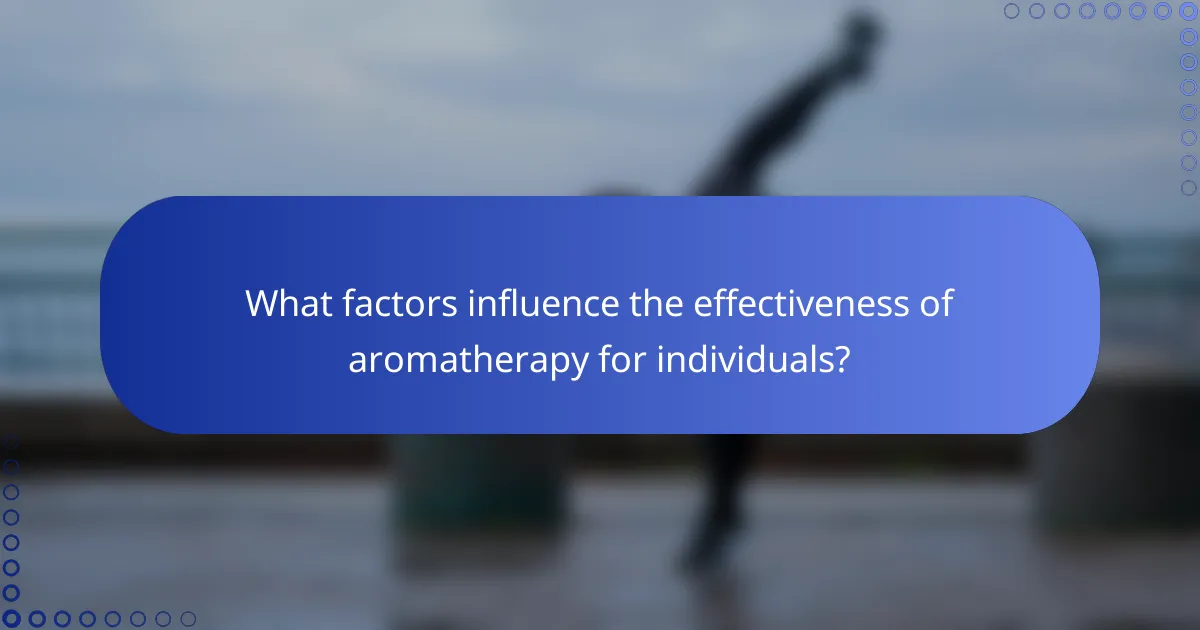
What factors influence the effectiveness of aromatherapy for individuals?
Several factors influence the effectiveness of aromatherapy for individuals, including personal sensitivity to scents, the type of essential oils used, and the method of application. Individual preferences and environmental context also play significant roles. For instance, some may respond better to citrus oils for mood enhancement, while others may find lavender more calming. Additionally, the duration and frequency of exposure can affect outcomes, as regular use often yields better results.
How do personal preferences affect the choice of essential oils?
Personal preferences significantly influence the choice of essential oils for aromatherapy. Individuals may select oils based on scent, emotional response, or past experiences. For instance, lavender is often chosen for its calming effects, while citrus oils may be preferred for uplifting moods. Unique attributes, such as personal memories associated with specific scents, further guide these choices. Additionally, preferences can vary based on cultural background and lifestyle, affecting the overall effectiveness of aromatherapy in anxiety management and mood improvement.
What are the psychological aspects that impact the experience of aromatherapy?
Aromatherapy positively influences anxiety management and mood improvement through various psychological aspects. The scents used in aromatherapy can trigger emotional responses, reducing stress and enhancing relaxation.
Studies show that specific essential oils, such as lavender and bergamot, can lower cortisol levels, promoting a sense of calm. The unique attribute of aromatherapy lies in its ability to create personalized experiences, as individuals may respond differently to various scents based on personal memories and associations.
Additionally, the ritual of using aromatherapy can enhance mindfulness, allowing individuals to focus on the present moment. This practice can lead to improved emotional regulation and overall well-being.
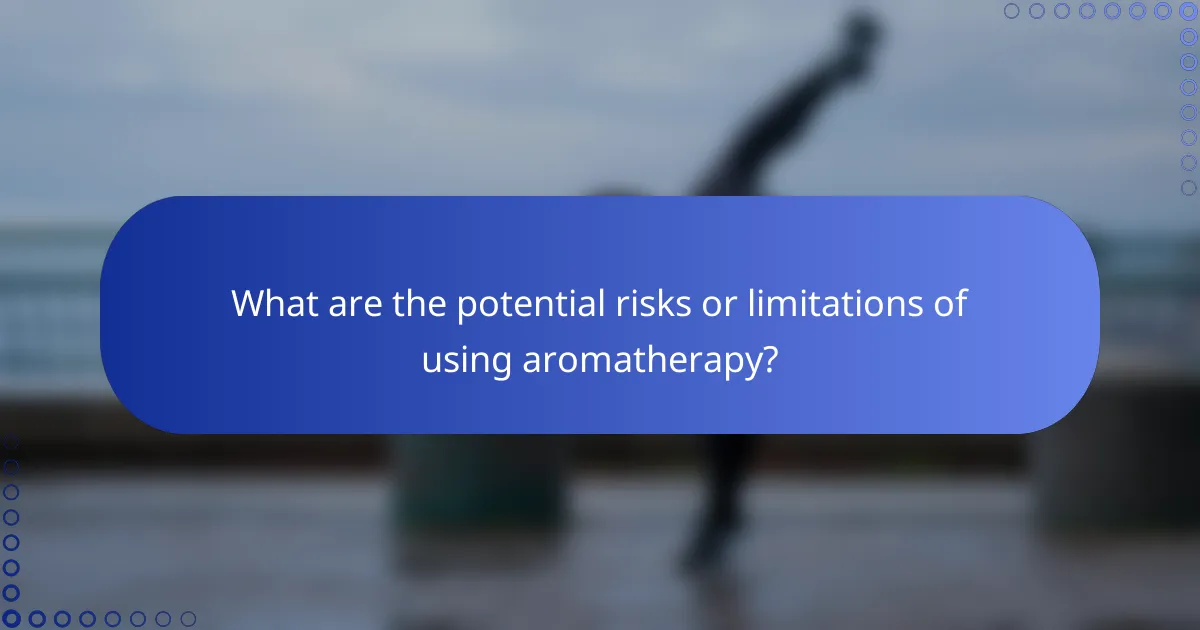
What are the potential risks or limitations of using aromatherapy?
Aromatherapy can pose risks such as allergic reactions, skin irritation, and respiratory issues. Essential oils may interact with medications, leading to adverse effects. Individuals with certain health conditions should consult healthcare professionals before use. Quality and purity of oils can vary, impacting safety and effectiveness.
Which essential oils should be avoided for certain individuals?
Certain individuals should avoid essential oils like eucalyptus, peppermint, and rosemary due to potential adverse reactions. Pregnant women, young children, and those with specific health conditions may experience sensitivity to these oils. For example, eucalyptus can be harmful to young children and pregnant women. Rosemary may trigger seizures in individuals with epilepsy. Always consult a healthcare professional before using essential oils for anxiety management and mood improvement.
What are the common misconceptions about the safety of aromatherapy?
Many believe aromatherapy is entirely safe, but misconceptions exist. Some think essential oils are harmless, overlooking potential allergic reactions or interactions with medications. Others assume that all oils are safe for everyone, ignoring that children and pregnant individuals may require caution. Additionally, the idea that aromatherapy can replace traditional medical treatments is misleading; it should complement, not substitute, professional care. Understanding these misconceptions enhances informed use of aromatherapy for anxiety management and mood improvement.
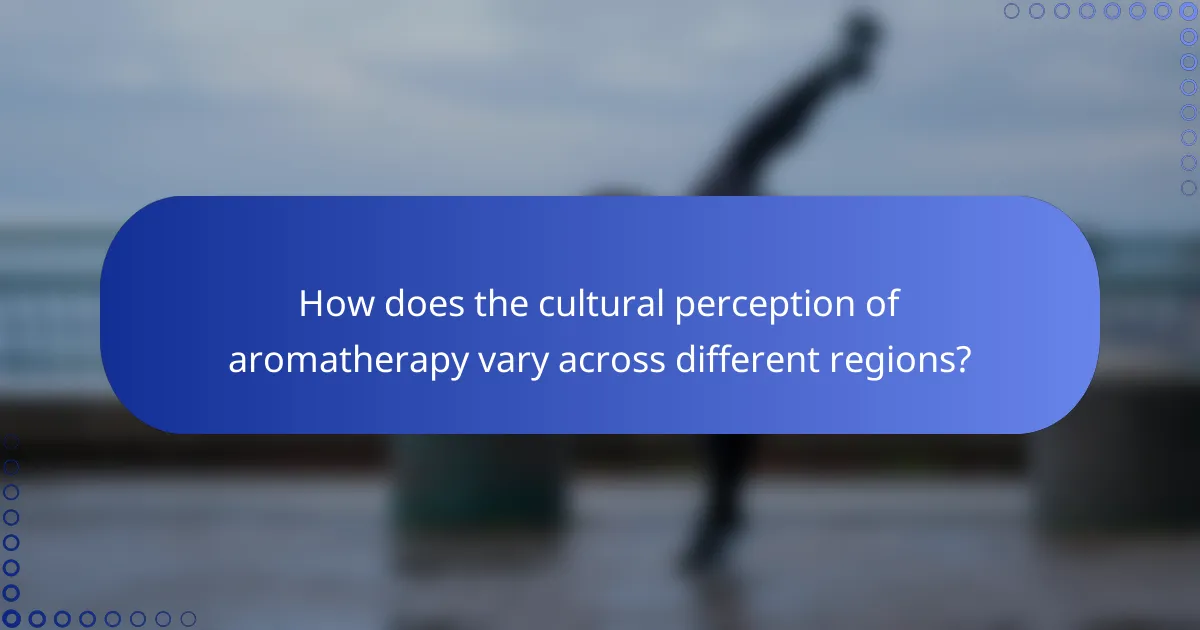
How does the cultural perception of aromatherapy vary across different regions?
Cultural perception of aromatherapy varies significantly across regions, influencing its acceptance and practices. In Western cultures, aromatherapy is often viewed as a complementary therapy for anxiety management and mood improvement. Conversely, in Eastern cultures, it is deeply rooted in traditional practices, often integrated into holistic health approaches.
In Europe and North America, aromatherapy is commonly associated with relaxation and stress relief. Studies indicate that essential oils like lavender and chamomile are frequently used for their calming effects. In contrast, in Asian countries, such as India and China, aromatherapy is intertwined with ancient medicinal practices, emphasizing balance and energy flow.
Regional preferences also affect the choice of essential oils. For instance, citrus oils are popular in Mediterranean countries for their uplifting properties, while sandalwood is favored in South Asia for its grounding effects. This diversity highlights the unique attributes of aromatherapy shaped by cultural contexts.
Ultimately, the varying cultural perceptions of aromatherapy influence its practices, applications, and the specific benefits individuals seek from its use.
What are the traditional uses of aromatherapy in various cultures?
Aromatherapy has been used in various cultures for anxiety management and mood improvement. In ancient Egypt, essential oils were utilized for relaxation and spiritual rituals. Traditional Chinese medicine incorporates aromatherapy to balance emotions and promote mental clarity. In India, Ayurveda employs essential oils for calming the mind and enhancing emotional well-being. Native American practices include the use of aromatic plants for cleansing and restoring harmony. Each culture highlights the therapeutic properties of scents to alleviate stress and uplift mood.
How has modern science validated ancient practices in aromatherapy?
Modern science has confirmed that aromatherapy can effectively reduce anxiety and enhance mood. Research indicates that essential oils, such as lavender and bergamot, significantly lower stress levels and improve emotional well-being. A study found that inhaling lavender oil reduced anxiety scores by 30% in participants. Additionally, aromatherapy promotes relaxation through its impact on the limbic system, which regulates emotions. This validation of ancient practices highlights the therapeutic potential of aromatherapy in contemporary mental health management.
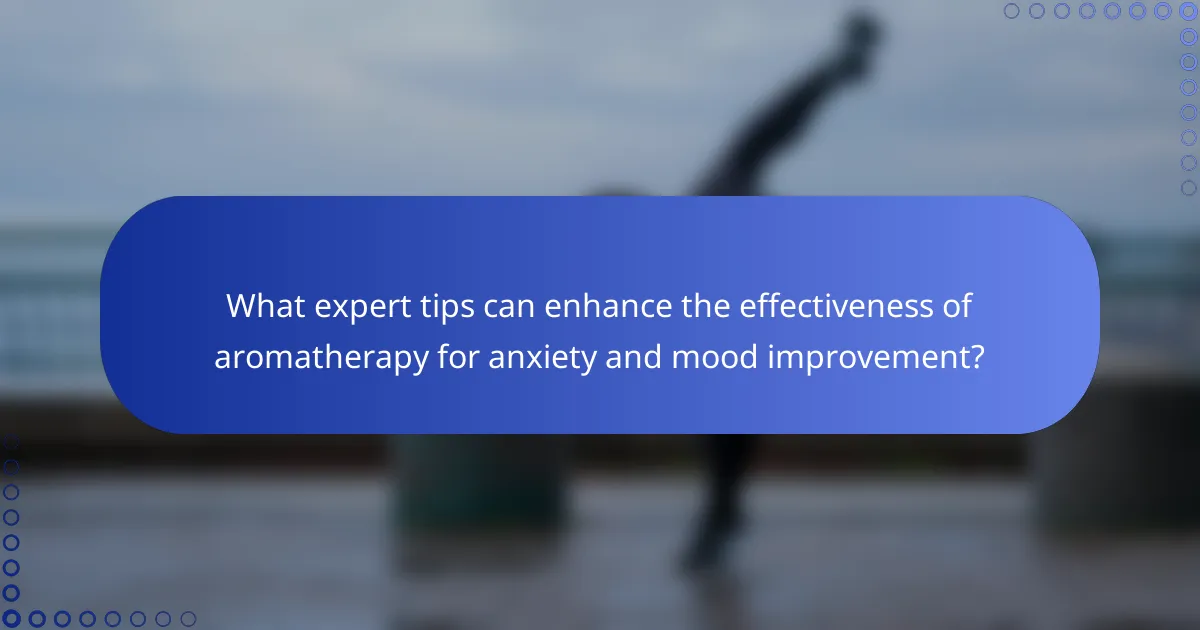
What expert tips can enhance the effectiveness of aromatherapy for anxiety and mood improvement?
To enhance the effectiveness of aromatherapy for anxiety management and mood improvement, choose essential oils known for their calming properties. Use oils like lavender, chamomile, and bergamot, which are scientifically supported for reducing anxiety. Diffuse these oils in your space or add them to a warm bath for relaxation.
Incorporate mindfulness practices with aromatherapy. Pair deep breathing exercises with the scent of essential oils to deepen relaxation and improve mood. Regular use can create a positive association between scent and calmness.
Experiment with different methods of application. Inhalation, topical application, or using a diffuser can yield varying effects. Find what method works best for your personal experience and preferences.
Consider the importance of quality. Use pure, high-quality essential oils to ensure maximum benefits. Avoid synthetic fragrances that may not provide the same therapeutic effects.
What common mistakes should be avoided when using essential oils?
Common mistakes to avoid when using essential oils include improper dilution, using low-quality oils, neglecting individual sensitivities, and applying oils without research. These errors can lead to skin irritation, ineffective results, or adverse reactions. Always prioritize quality and proper usage to enhance aromatherapy benefits for anxiety management and mood improvement.
How can individuals create a personalized aromatherapy plan?
Individuals can create a personalized aromatherapy plan by identifying their specific anxiety triggers and mood goals. First, select essential oils known for their calming properties, such as lavender or chamomile. Next, determine the preferred method of use, whether through diffusing, topical application, or inhalation. Consider the duration and frequency of use that best fits your routine. It’s beneficial to track the effects of chosen oils to refine the plan over time. Personalization may also involve blending oils to enhance their effectiveness and create a unique scent profile that resonates with individual preferences.